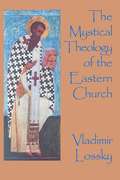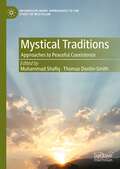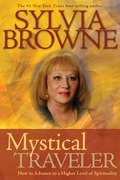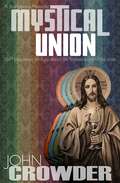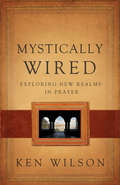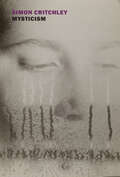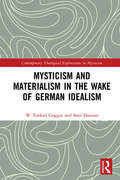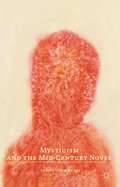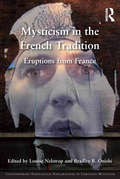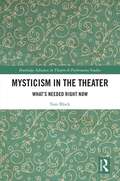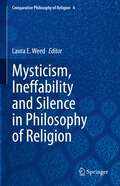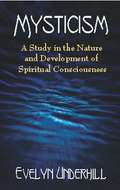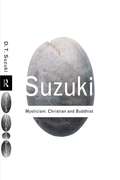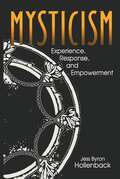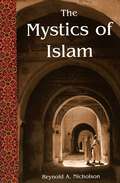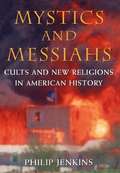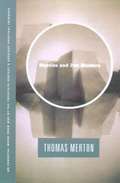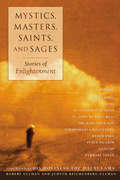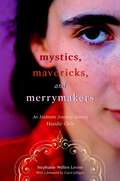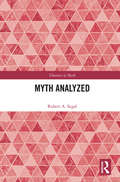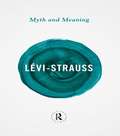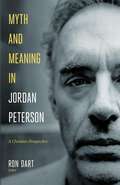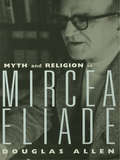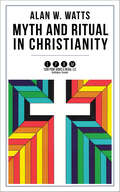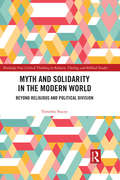- Table View
- List View
Mystical Theology of the Eastern Church
by Vladimir Lossky James ClarkeThrough a combination of careful scholarship and the warmth of the deep personal devotion of the author, this book provides the authoritative English study of Eastern orthodox theology. Lossky's account makes clear the profound theological differences between East and West, as well as offering an important contribution to ecumenism and to the life of Christian devotion. The tradition of the Eastern Church is presented as a mystical theology with doctrine and experience mutually supporting each other. The Mystical Theology of the Eastern Church was first published in Paris in 1944 as Essai sur la Theologie Mystique de l'Eglise d'Orient. It has been translated by a small group of members of the Fellowship of St Alban and St Sergius, which exists to promote understanding between Eastern and Western Christians.
Mystical Traditions: Approaches to Peaceful Coexistence (Interdisciplinary Approaches to the Study of Mysticism)
by Muhammad Shafiq Thomas Donlin-SmithThis book discusses mysticism and its possible contributions to a positive common human future. It is organized into three parts - “Studies of Mystical Traditions,” “Comparative Studies of Mystical Traditions,” and “Social and Ethical Implications." The approach is philosophical and critical. The contributors differ on whether or not mystical traditions would restore peaceful living and peaceful coexistence. However, the problem before this manuscript is the growing pain and suffering caused by greed in the world, greed causing economic disequilibrium, racism and divisiveness causing social unrest resulting in mass migration and refugees’ crisis. Through the lens of “mystical traditions," the manuscript proposes a balance approach between material and spiritual needs of people. To strengthen human spiritualty, the manuscript emphasizes practicing meditation, music, prayers, zikr, yoga, mindfulness, fasting and other methods of spiritual revival for peace within self and with others.
Mystical Traveler: How To Advance To A Higher Level Of Spirituality
by Sylvia BrowneSylvia Browne takes us on another incredible journey . . . this time presenting information about the Mystical Traveler. She explains the difference between Mystical Travelers and Mission Life Entities (those who have a mission in life); and goes into great depth about who they are, what they do, and even how to become one! Combining factual research garnered in her trance mediumship with new insights from her spirit guide Francine, Sylvia guides us through the necessary steps to become more spiritual using the Eight Golden Keys and Seven Rays from God. She then takes us a step further and tells us how we can all choose to become either a Mystical Traveler or Mission Life Entity for God. This is a fascinating, in-depth study for anyone who wants to become more spiritual and join "God’s army"—that is, those who wish to spread positive energy rather than evil and negativity.
Mystical Union
by John CrowderWith clear revelatory truths on the New Creation and the scandalous joys of the cross, Mystical Union promises to be one of John Crowder's most revolutionary, lifechanging works.
Mystically Wired
by Ken WilsonWe are designed to make connections to God through prayer in more ways than we can imagine. Prayer can be so much more than a simple conversation. It can be a wordless connection with God, a step beyond the boundary of the separated self. It can be a way to listen to the silence. And it can be learned. We can learn how to pray in ways we never thought possible. It doesn't take more effort; it takes more understanding. Wilson's book shows how the brain is designed by God: To calm itself To relax into love To become increasingly aware of how connected everything is in God To experience a deeper intimacy with our Creator Prayer is something that our brains want to do with a little help. Ken Wilson tells us how. Praise for Mystically Wired: "Smart, savvy, candid, credible, unafraid, self-effacing, and shot through with passionate love of Jesus . . . yes, hands down, this is the best book on prayer that I have ever read. -- Phyllis Tickle, Compiler, The Words of Jesus: A Gospel of the Sayings of Our Lord "I confess, I don't normally like books on prayer, but Mystically Wired is a big exception. While this book is incredibly practical, I was routinely blown away by the intuitive genius of Ken's view and application of prayer. Page after page, thinking I knew what was next, I was surprised with fresh insight and unique perspectives on connecting with God. Being an evangelist, I was excited to realize I could also send this to spiritual friends who don't follow Jesus as a way to introduce him." -- R. York Moore, National Evangelist InterVarsity Christian Fellowship USA "It began the day Jesus' disciples came to him and asked, 'Lord, teach us to pray.' Ever since, Christ-followers have been wanting to learn the ways of prayer. Ken Wilson's Mystically Wired is an extraordinary contribution to that learning tradition. It's a wonderful read that leaves you feeling, 'Yes, this is for me. Yes, I can do this. Yes, it's within reach.'" -- Brian McLaren, Author/Speaker/Activist "I wandered away from religion because religion thought it had all the answers. Pastor Ken Wilson, though, understands that life and faith are really about having the right questions. If you want to pray for favors, put this book down now. If you want the answers, the help here is only partial. But if you're looking for a wide-ranging inquiry, and a path that can bring you closer to the mystery--without the mumbo-jumbo--delve within." -- Carl Safina, Author, Song for the Blue Ocean and The View From Lazy Point "Mystically Wired was a breath of fresh apologetic air for me. I pray and I experience God, and I find fixed hour prayer deeply meaningful, but this book shows that God made us to do such things and our brain is wired to communicate with God." -- Scot McKnight, Karl A. Olsson Professor in Religious Studies, North Park University "In my library there are scores of books on prayer--by legends and modern guides as well. It is not easy to make a genuine contribution to this body of literature. But Ken Wilson has done so. Mystically Wired manages to bring together the best of the sciences and philosophies of mind, brain, and consciousness with deep spirituality and candid personal reflection. While it will happily fit my on my shelf, it fits best in a heart yearning to pray." -- Todd Hunter, Anglican Bishop
Mysticism
by Simon CritchleyA probing, inspiring exploration of mysticism not as religious practice but as a mode of experience and way of life by one of the most provocative philosophical thinkers of our time.Why mysticism? It has been called &“experience in its most intense form,&” and in his new book the philosopher Simon Critchley poses a simple question to the reader: Wouldn&’t you like to taste this intensity? Wouldn&’t you like to be lifted up and out of yourself into a sheer feeling of aliveness, both your life and those of the creatures that surround you? If so, it might be well worthwhile trying to learn what is meant by mysticism and how it can shift, elevate, and deepen the sense of our lives. Mysticism is not primarily a theoretical issue. It's not a question of religious belief but of felt experience and daily practice. A rough and ready definition of mysticism is that it is a way of systematically freeing yourself of your standard habits, your usual fancies and imaginings so as to see what is there and stand with what is there ecstatically. Mysticism is the practical possibility of the achievement of a fluid openness between thought and existence. This is a book about trying to get outside oneself, to lose oneself, while knowing that the self is not something that can ever be fully lost. It is also a book about Julian of Norwich, Anne Carson, Annie Dillard, T.S. Eliot, and Nick Cave. It shows how listening to music can be secular worship. It is a book full of learning, puzzlement, pleasure, and wonder. It opens the door to mysticism not as something unworldly and unimaginable, but as a way of life.
Mysticism and Materialism in the Wake of German Idealism (Contemporary Theological Explorations in Mysticism)
by Sean Hannan W. Ezekiel GogginThis book argues that the rediscovery of mystical theology in nineteenth-century Germany not only helped inspire idealism and romanticism, but also planted the seeds of their overcoming by way of critical materialism. Thanks in part to the Neoplatonic turn in the works of J. G. Fichte, as well as the enthusiasm of mining engineer Franz X. von Baader, mystical themes gained a critical currency, and mystical texts returned to circulation. This reawakening of the mystical tradition influenced romantic and idealist thinkers such as Novalis and Hegel, and also shaped later critical interventions by Marx, Benjamin, and Bataille. Rather than rehearsing well-known connections to Swedenborg or Böhme, this study goes back further to the works of Meister Eckhart, Nicholas of Cusa, Catherine of Siena, and Angela of Foligno. The book offers a new perspective on the reception of mystical self-interrogation in nineteenth-century German thought and will appeal to scholars of philosophy, history, theology, and religious studies.
Mysticism and the Mid-Century Novel
by James ClementsThis book argues that many of the mid-twentieth century's significant novelists were united by a desire to return the increasingly interior novel to ethical engagement. They did not seek morality in society, politics or the individual will, but sought to unveil a transcendent Good by using techniques drawn from the canon of mystical literature
Mysticism in the French Tradition: Eruptions from France (Contemporary Theological Explorations in Mysticism)
by Louise Nelstrop Bradley B. OnishiIn the nineteenth and early twentieth centuries secular French scholars started re-engaging with religious ideas, particularly mystical ones. Mysticism in the French Tradition introduces key philosophical undercurrents and trajectories in French thought that underpin and arise from this engagement, as well as considering earlier French contributions to the development of mysticism. Filling a gap in the literature, the book offers critical reflections on French scholarship in terms of its engagement with its mystical and apophatic dimensions. A multiplicity of factors converge to shape these encounters with mystical theology: feminist, devotional and philosophical treatments as well as literary, historical, and artistic approaches. The essays draw these into conversation. Bringing together an international and interdisciplinary range of contributions from both new and established scholars, this book provides access to the melting pot out of which the mystical tradition in France erupted in the twenty-first century, and from which it continues to challenge theology today.
Mysticism in the Theater: What’s Needed Right Now (Routledge Advances in Theatre & Performance Studies)
by Tom BlockMysticism in the Theater introduces theater makers to the power and possibility of using historical mystical ideas to influence all aspects of a production. Historical mysticism represents ideas developed by recognized spiritual thinkers in all religions and time periods: individuals who stilled their ego, and perceived the unity of all, hidden within the apparent multiplicity of existence. This unique manner of spiritual inlay allows theatrical presentations to find the height of artistic expression: art at the intersection of our historical moment and the eternal. This study introduces theater makers to the history of mystical inspiration within performance work and develops strategies for inserting mystical ideas into their productions. The book ties this model into theatre’s history, as mystical ideas and quotes have been inserted into productions from Greek theatre through Shakespeare and into the present day. This book explores how teachings and ideas of specific historical mystical thinkers might influence all aspects of contemporary theatrical productions including writing, directing, acting, stagecraft/set design, lighting design, costume design, sound design, and choreography.
Mysticism, Ineffability and Silence in Philosophy of Religion (Comparative Philosophy of Religion #4)
by Laura E. WeedThe authors in this volume explore a wide variety of the contemporary approaches to mystical and religious experience to elucidate what religious experience is, in its own terms, and how its practitioners understand it. This anthology features contributions that point out that contemporary studies of consciousness, sociology, hermeneutics, neuroscience, medicine, and other fields, are revealing that there is much more to be said for the inner life of a human’s consciousness than reductionists and behaviorists will allow.This book is one of very few that primarily takes the stance of academic practitioners, explaining their own experience, rather than that of academics trying to explain the phenomena away, as really politics, or sociology, or delusion, or psychological pathology, or literary flights of fancy, or an aberration of any of the other academic fields. Most of the authors in this volume embrace the task of explaining and analyzing religious experience, mysticism, and the healing power of silence and presence, using the resources of all of the academic disciplines, as appropriate. The essays contained analyze religious, and non-religious, mystical and profoundly personal experiences across several world religions, and in areas such as art and music, as well as in solving personal crises such as family disruption and patriarchal oppression. The authors address the subject matter through analyses of the frequent and destructive failures of language, or just noise, to capture or express the nuances of the inner life of a person. It is this very ineffability of self that renders the spiritual, emotional and interior life of individuals beyond cognition and perception, of the straightforward sorts embraced by most cognitive disciplines. The contributors come from a variety of cross-disciplinary fields to bring forth the possibilities for an intuitive and creative, rich and growing inner life for a human. This text appeals to students, researchers, and practitioners.
Mysticism: A Study in the Nature and Development of Spiritual Consciousness
by Evelyn UnderhillMysticism is usually thought of as an intense state involving personal unification with the Divine or Ultimate Reality. By its very nature, it is an ineffable experience, impossible to put into words. It is not impossible, however, to study the phenomenon, with an eye toward understanding not only its nature and manifestations, but its relationship to spirituality in general. This book is such a study. Widely considered the best book on mysticism for the general reader, this classic volume assembles a broad range of information scattered among monographs and textbooks in many languages.The work of a noted British authority on mysticism, it is divided into two parts: the first provides an introduction to the general subject of mysticism and its relation to metaphysics, psychology, theology, magic, and symbolism. The second and longer part contains a detailed study of the nature and development of spiritual or mystical consciousness, including such topics as the awakening of the self, the purification of the self, voices and visions, introversion, ecstasy and rapture, the dark night of the soul, and the unitive life. An interesting appendix provides a historical sketch of European mysticism from the beginning of the Christian era to the death of Blake.Richly documented with material drawn from such great mystics as St. Teresa, Meister Eckhart, St. John of the Cross, and William Blake, this remarkable study will be of immense interest to students, psychologists, theologians — anyone interested in this extremely personal and powerful form of spiritual life.
Mysticism: Christian And Buddhist (Routledge Classics)
by D. T. SuzukiIf the Western world knows anything about Zen Buddhism, it is down to the efforts of one remarkable man, D.T. Suzuki. The twenty-seven year-old Japanese scholar first visited the West in 1897, and over the course of the next seventy years became the world's leading authority on Zen. His radical and penetrating insights earned him many disciples, from Carl Jung to Allen Ginsberg, from Thomas Merton to John Cage. In Mysticism: Christian and Buddhist Suzuki compares the teachings of the great Christian mystic Meister Eckhart with the spiritual wisdom of Shin and Zen Buddhism. By juxtaposing cultures that seem to be radically opposed, Suzuki raises one of the fundamental questions of human experience: at the limits of our understanding is there an experience that is universal to all humanity? Mysticism: Christian and Buddhist is a book that challenges and inspires; it will benefit readers of all religions who seek to understand something of the nature of spiritual life.
Mysticism: Experience, Response, and Empowerment (Hermeneutics: Studies in the History of Religions)
by Jess HollenbackThis sweeping study of mysticism by Jess Hollenback considers the writings and experiences of a broad range of traditional religious mystics, including Teresa of Avila, Black Elk, and Gopi Krishna. It also makes use of a new category of sources that more traditional scholars have almost entirely ignored, namely, the autobiographies and writings of contemporary clairvoyants, mediums, and out-of-body travelers. This study contributes to the current debate about the contextuality of mysticism by presenting evidence that not only are the mystic's interpretations of and responses to experiences culturally and historically conditioned, but historical context and cultural environment decisively shape both the perceptual and affective content of the mystic's experience as well.Hollenback also explores the linkage between the mystic's practice of recollection and the onset of other unusual or supernormal manifestations such as photisms, the ability to see auras, telepathic sensitivity, clairvoyance, and out-of-body experiences. He demonstrates that these extraordinary phenomena can actually deepen our understanding of mysticism in unexpected ways.A unique feature of this book is its in-depth analysis of "empowerment," an important phenomenon ignored by most scholars of mysticism. Empowerment is a peculiar enhancement of the imagination, thoughts, and desires that frequently accompanies mystical states of consciousness. Hollenback shows its cross-cultural persistence, its role in constructing the perceptual and existential environments within which the mystic dwells, and its linkage to the fundamental contextuality of mystical experience.
Mystics Of Islam
by Reynold A. NicholsonThe Mystics of Islam, first published in 1914, has long been recognized as a classic and definitive introduction to the message of Sufism. In this short but comprehensive work, R.A. Nicholson—who was one of the greatest Islamic scholars of the early 20th century—provides the general reader with an easy approach to the study of Islamic mysticism. He gives a broad outline of Sufism and describes the key principles, methods and characteristic features of the inner life as it has been lived by Muslims of every class and condition from the 8th century onwards. Many quotations are given, mainly in the author's own fine translations from the original Arabic and Persian.
Mystics and Messiahs: Cults and New Religions in American History
by Philip Jenkins[Book Jackets] "Are religious fringe movements a recent phenomenon in American history? Are widespread fears of mass suicides, sexual abuse, and brainwashing in cults justified? Do marginalized religious groups play any positive role in American spiritual life? Do the panics over such groups follow any discernible pattern? Philip Jenkins gives fascinating--and surprising--answers to these and many other questions in Mystics and Messiahs, the first full account of cults and anti-cult scares in American history. Jenkins shows that, contrary to popular belief, cults were by no means an invention of the 1960s. In fact, most of the frightening images and stereotypes surrounding fringe religious movements are traceable to the mid-nineteenth century when Mormons, Freemasons, and even Catholics were vehemently denounced for supposed ritualistic violence, fraud, and sexual depravity. As Charles Ferguson observed in 1928, "America has always been the sanctuary of amazing cults." But America has also been the home of an often hysterical anti-cult backlash. Jenkins provides an insightful new analysis of why cults arouse such fear and hatred both in the secular world and in mainstream churches, many of which--Baptists, Quakers, Pentecostals, and Methodists--were themselves originally regarded as cults. Most importantly, Jenkins argues that an accurate historical perspective is urgently needed if we are to avoid the kind of catastrophic confrontation that occurred in Waco or the ruinous prosecution of imagined Sattanic cults in the 1980s. While not ignoring genuine instances of aberrant behavior, Mystics and Messiahs goes beyond the vast edifice of myth, distortion, and hype to reveal the true characteristics of religious fringe movements and why they inspire such fierce antagonism."
Mystics and Zen Masters, First Edition
by Thomas MertonIn this collection, he discusses diverse religious concepts-early monasticism, Russian Orthodox spirituality, the Shakers, and Zen Buddhism-with characteristic Western directness. Merton not only studied these religions from the outside but grasped them by empathy and living participation from within.
Mystics, Masters, Saints, and Sages: Stories of Enlightenment
by Judyth Reichenberg-Ullman Robert UllmanBe inspired by these 34 unique stories of the moment of enlightenment. In each of the stories in this book lay spiritual gems waiting to be discovered by the sincere seeker. This is not just a dry text. These writings were authored directily by realized beings describing their own experience in crossing over from individual to cosmic consciousness. Such dramatic and immediate accounts will open your heart and mind to the possibility of your own inner peace, enlightenment, and self-realization. These stories have the power to transmit the state of these great beings, which can aid you in awakening to your divine nature.
Mystics, Mavericks, and Merrymakers: An Intimate Journey among Hasidic Girls
by Stephanie Wellen Levine Carol Gilligan&“Absorbing . . . one subculture&’s corrective to Reviving Ophelia, in that it offers a refreshing portrait of adolescent girls who are far from insecure.&” —Publishers Weekly (starred review) From the ardently religious young woman who longs for the life of a male scholar to the young rebel who visits a strip club, smokes pot, and agonizes over her loss of faith to the proud Lubavitcher with a desire for a high-powered career, Stephanie Wellen Levine provides a rare glimpse into the inner worlds and daily lives of these Hasidic girls. Lubavitcher Hasidim are famous for their efforts to inspire secular Jews to become more observant and for their messianic fervor. Strict followers of Orthodox Judaism, they maintain sharp gender-role distinctions. Levine spent a year living in the Lubavitch community of Crown Heights, Brooklyn, participating in the rhythms of Hasidic girlhood. Drawing on many intimate hours among Hasidim and over thirty in-depth interviews, Mystics, Mavericks, and Merrymakers offers rich portraits of individual Hasidic young women and how they deal with the conflicts between the regimented society in which they live and the pull of mainstream American life. This superbly crafted book offers intimate stories from Hasidic teenagers&’ lives, providing an intriguing twist to a universal theme: the struggle to grow up and define who we are within the context of culture, family, and life-driving beliefs. &“In an era seemingly plagued with sex, anorexia and depression among our nation&’s girls, a page from Mystics, Mavericks, and Merrymakers is a refreshing peek into the possibilities for growth, strength and self.&” —The Jewish New Weekly of Northern California
Myth Analyzed (Theorists of Myth)
by Robert A. SegalComparing and evaluating modern theories of myth, this book offers an overview of explanations of myth from the social sciences and the humanities. This ambitious collection of essays uses the viewpoints of a variety of disciplines - psychology, anthropology, sociology, politics, philosophy, religious studies, and literature. Each discipline advocates a generalization about the origin, the function, and the subject matter of myth. The subject is always not what makes any myth distinct but what makes all myths "myth". The book is divided into five sections, covering topics such as myth and psychoanalysis, hero myths, myth and science, myth and politics, and myth and the physical world. Chapters engage with an array of theorists--among them, Freud, Jung, Campbell, Rank, Winnicott, Tylor, Frazer, Malinowski, Levy-Bruhl, Levi-Strauss, Harrison, and Burkert. The book considers whether myth still plays a role in our lives is one of the issues considered, showing that myths arise anything but spontaneously. They are the result of a specific need, which varies from theory to theory. This is a fascinating survey by a leading voice in the study of myth. As such, it will be of much interest to scholars of myth and how it interacts with Sociology, Anthropology, Politics and Economics.
Myth and Meaning (Routledge Great Minds)
by Claude Lévi-StraussThe anthropologist Claude Levi-Strauss was one of the greatest intellectuals of the twentieth century. His work has had a profound impact not only within anthropology but also linguistics, sociology and philosophy. In this short book he examines the nature and role of myth in human history, distilling a lifetime of writing into a few sharp insights. It is a crystalline overview of many of the basic ideas underlying his work, including the theory of structuralism and the difference between 'primitive' and 'scientific' thought and shows why Levi-Strauss remains a hugely important intellectual figure. With a new foreword by Patrick Wilcken.
Myth and Meaning in Jordan Peterson: A Christian Perspective
by Ron DartPopular philosopher Jordan Peterson has captured the imagination of Western world. For some, Peterson represents all that is wrong with patriarchal culture; for others, he is the Canadian academic prophet who has come to save civilization from dizzying confusion. Regardless of how one feels about him, his influence in North America--and beyond--is difficult to deny. While the "Peterson phenomenon" has motivated numerous articles and responses, much of what has been written is either excessively fawning or overly critical. Little has been produced that explores Peterson's thought--especially his immensely popular 12 Rules for Life--within the context of his overall context and scholarly output. How is one to understand the ascendency of Jordan Peterson and why he's become so popular? Does his earlier Maps of Meaning shed light on how one might understand his worldwide bestseller, 12 Rules for Life? In Myth and Meaning in Jordan Peterson, scholars across various disciplines explore various aspects of Jordan Peterson's thought from a Christian perspective. Both critical and charitable, sober-minded and generous, this collection of ten essays is a key resource for those looking to faithfully engage with Jordan Peterson's thought.
Myth and Religion in Mircea Eliade (Theorists Of Myth Ser. #Vol. 11)
by Douglas AllenThis multidisciplinary study is the first book devoted entirely to the critical interpretation of the writings of Mircea Eliade on myth. One of the most popular and influential historians and theorists of myth, Eliade argued that all myth is religious. Douglas Allen critically interprets Eliade's theories of religion, myth, and symbolism and analys
Myth and Ritual in Christianity
by Alan WattsA penetrating and wide-ranging study of mythological processes and their particular manifestation in Christian religion, Alan Watt's Myth and Ritual in Christianity is widely considered a classic. Using the lens of the "doctrine of mystical tradition", Watts explores the development of church doctrine in relation to the procession of seasons and finds, contrary to many contemporary critics, that Christianity cultivates virtue and promotes living in the now.
Myth and Solidarity in the Modern World: Beyond Religious and Political Division (Routledge New Critical Thinking in Religion, Theology and Biblical Studies)
by Timothy StaceyIn the context of the rise of reactionary politics across the globe, this book seeks new ways of developing solidarity across religious, political and economic differences. Drawing on an increasingly influential Christian theological movement, postliberalism, it claims that the dominance of liberal, secular rationality has blinded people to the fundamental role of transcendence and myth in developing solidarity. The result is either atrophy, or a retrenching in divisive myths of faith, race, nation or economic status. Liberalism is now a dominant force across the globe. But its resonance in the Anglo-Saxon West, from which it originates and has been most fully realized, is relatively underexplored. The book thus follows two simultaneous lines of enquiry. Firstly, a genealogical study of social scientific and policy iterations of the relationship between belief and solidarity in the Anglo-Saxon West, placing postliberal theory into dialogue with the sociology and anthropology of religion, politics and economics. Secondly, it draws from original ethnographic research with groups in London, UK, that seek to develop solidarity in the face of deep-seated difference. By bringing a new way of framing these contentious debates about contemporary society, this research offers tools for more productive conversations around religious and political topics, in particular concluding with a clear policy proposal. It is, therefore, a useful resource for both academics of theology and religious studies, political philosophy, sociology and anthropology; and for politicians, policy makers and practitioners hoping to develop solidarity in the modern world.
